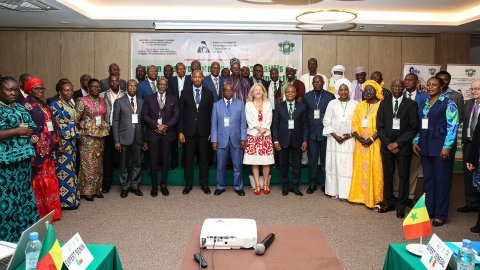A collective commitment to prioritise foundational learning has emerged from the 2023 High-Level Policy Dialogue Forum on Foundational Learning, hosted by the Ministry of Education in the Republic of Zambia and organised by the Association for the Development of Education in Africa (ADEA).
Ten African Ministers of Education and 11 ministerial representatives joined forces to advocate for foundational learning as a central focus for the 2024 African Union Year of Education (AUYoE) and beyond.
The ministers, in collaboration with the host nation, Zambia, and the ADEA, issued a communique outlining their resolutions and strategies to bolster the importance of foundational learning across the continent. Their key decisions included.
Heads of State as Champions: The ministers committed to rally their respective Heads of State to become “Champions of Foundational Learning,” underlining the significance of this critical education domain.
Foundational Learning Starter Pack: An agreement was reached to develop a foundational learning starter pack model, serving as a resource guide to ensure uniformity, continuity, and sustainability of foundational learning efforts.
Data Collection: The leaders resolved to collect pertinent data in partnership with ADEA and other stakeholders. This data will inform policies, facilitate decision-making processes, foster dialogues, enable peer learning, and promote the sharing of successful foundational learning practices in support of the AUYoE.
Linking Early Childhood and Primary Education: A crucial emphasis was placed on strengthening the connections between Early Childhood Education and Primary Education to provide a seamless transition for students.
Structured Pedagogy and Age-Appropriate Teaching Methods: The adoption of structured pedagogy and age-appropriate teaching methods was highlighted as a means to enhance the quality of education and foundational learning.
Technology Integration: Recognising the power of technology, the ministers underscored the need to leverage technology to increase the number of qualified teachers and improve their well-being.

The Forum served as a platform for African countries to showcase innovative, context-specific solutions that have yielded tangible results. Nations such as Benin, Botswana, Kenya, Liberia, Madagascar, Mauritius, Senegal, and Zambia, among others, demonstrated their commitment to addressing the foundational learning challenge.
President Hakainde Hichilema of the Republic of Zambia, represented by the Minister of Education, Douglas Munsaka Syakalima, emphasised the pivotal role of foundational learning in shaping Africa’s development. He highlighted that building a foundation in numeracy and literacy is essential for the continent’s progress.
Read also: Qatar Foundation’s WISE to revolutionise education in AI age
“This forum underscores the belief that foundational learning is at the base of any effort to change the course of Africa’s development. It is by building people that we will derive the resources to craft a new vision and bring such a vision to life. Without foundational skills in numeracy and literacy, there can be no further learning quality,” Syakalima said.
Albert Nsengiyumva, the executive secretary of ADEA, commended the participating ministers for their dedication to addressing the learning crisis in Africa. He stressed the importance of developing locally relevant solutions to overcome this challenge.
Nsengiyumva said, “I am inspired by the collective commitment of our members in tackling this crisis, and to developing globally relevant solutions that can be applied anywhere. Africa is the continent most affected by the learning crisis, and it is where the solutions must be developed.”
He added, “I must commend the Ministers attending for the work they have done, the leadership they are showing, and the results that they are delivering. We must build on this momentum to accelerate the progress that will make Africa a leader in the global response to the learning crisis.”
Furthermore, Benjamin Piper, director of Global Education at the Bill and Melinda Gates Foundation, advocated for scaling effective strategies in foundational learning, emphasising the need to expand successful approaches.
“We know what works to boost foundational learning in Africa; structured pedagogy is one way; teaching at the right level is another so we need to do more of what works at scale.”
Similarly, Obiageli Ezekwesili, the founder of Human Capital Africa and co-convener of the foundational learning ministerial coalition, stressed the importance of data-driven decision-making and the need for rigorous evidence to design effective solutions.
“Ministers need to be informed by rigorous data and evidence to design appropriate solutions for their national contexts and ensure that progress can be tracked, remedial action taken, and transparency and accountability embedded in the response.”
The Forum included school visits, providing participants with a firsthand look at the integration of social-emotional skills through play-based learning, bridging the gap between policy and practice.
In closing, Conrad Sackey, minister of Education in Sierra Leone, encouraged countries to uphold and implement the resolutions agreed upon during the event.
The forum saw the active participation of 21 African countries, including Angola, Benin, Botswana, Cote d’Ivoire, Democratic Republic of Congo, eSwatini, Ghana, Kenya, Lesotho, Madagascar, Malawi, Mauritius, Namibia, Senegal, Sierra Leone, South Africa, Tanzania, The Gambia, Uganda, Zambia, and Zimbabwe, signifying a collective commitment to advancing foundational learning across the continent.












